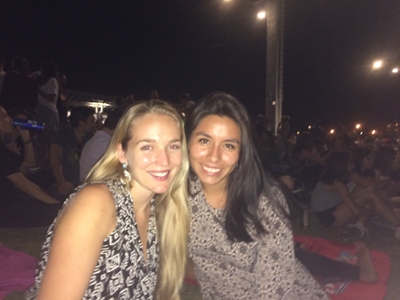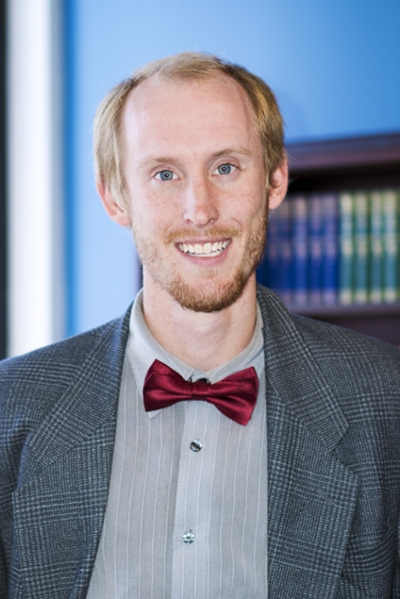FORMER M.A., CURRENT PH.D. STUDENTS
Each year, several of our Master’s students express interest in pursuing further graduate education. This fall, three of our Master’s students began this journey. We checked in with Georgia Nilsson Anderson (Vanderbilt University), Lucas Alward (University of Central Florida, Orlando) and Brian Goodwin (Georgia State) to see how things are going.
What is most surprising to you about your grad school experience so far?
Georgia:
What has been most surprising for me has been that the statistical coursework has not been nearly as painful as I anticipated. I am told we have a particularly excellent professor (and that is certainly true), but I think part of this is also that the course is meant to prepare us to succeed rather than to break us down. There is a general message that the math (while important) is secondary: it's understanding the concepts that truly counts, and our mentors have been flexible and patient in that regard. The aim of the course really seems to be to ensure that we emerge equipped, rather than mentally obliterated. I have never felt as though I could fail the course, and that sense of support has maintained my self-confidence, and even my interest, in topics that would have once sent me running like Bayesian analysis and Markov's inequality.
I will say, I am extremely grateful that I was warned about the "imposter syndrome" before beginning the PhD program. Everybody seems incredibly intelligent, well-read, and accomplished. Students in my courses actually finish all of the reading and come prepared with interesting comments and insightful questions. I have learned how to be inspired, rather than intimidated by this. Although I don't think imposter syndrome ever completely fades, I've had many conversations since I've been here with professors and older grad students who assure me that everybody feels it - and if you don't, you're likely doing something wrong.
The department places a strong emphasis on being active in department events: job talks, presentations, speaker series etc. There is an expectation that graduate students attend when possible, remain engaged, and make an effort to ask questions. Although this has been a surprise and is often a major time commitment, I have noticed that this develops a strong sense of department solidarity. It is also a low-cost way to expose myself to ideas and methods I may not have otherwise encountered.
Luke:
One of the most surprising things about my graduate school experience was the adjustment period of moving to a new city and not really knowing anybody who lived there. Combined with the workload of starting graduate school, I was surprised how long it took me to adjust to new living situation and having to figure out a new routine in which I could comfortably work and concentrate on school. Also surprising was the experience of coming to the realization that you cannot do everything, that graduate school requires balance and sometimes that means taking time for yourself that is not work or research related. Although sometimes you might feel guilty about not reading or taking an extended break from writing, it is important to find that balance between school and time for yourself.
Brian:
For me, the most surprising aspect of grad school has been the level of professionalism that I have encountered between students and faculty. From my view, everyone understands they are in the same boat together, regardless of how long the person has been in it for. When I have questions for faculty and students, people are more than willing to go above and beyond to help me so that I have the tools to enhance my academic experience and knowledge. While this happened at Chico State, I see the intensity of such professionalism different at the doctorate level than it was in a Master’s program. Furthermore, I am actively working on two books for a professor. Working on both books has given me insight to one perspective on future publications that I may pursue; however, the benefit is that it has given me an inside view to the professional side of academia, something that I have thoroughly enjoyed, even though it can be frustrating at times.

What is not surprising? Or alternatively, did Chico State’s MA program prepare you well for something you’ve encountered in your PhD program?
Georgia:
In Chico State's MA program, I learned not only how to read a high volume of scholarly material each week, but also how to think analytically about the ideas, methods, and arguments presented therein. Reading for classes takes up the bulk of my time now (I'm assigned a minimum of 600 pages per week, conservatively), but the MA program taught me how to pick out what is theoretically important and interesting; how to synthesize ideas and identify broad debates.
Luke:
Although some of these experiences were surprising, Chico State’s MA program provided me the skills needed to adjust to the workload that is often required for Ph.D. programs. I was able to take what I learned throughout my experience at Chico State and apply those skills and lessons to my current program. I have also been fortunate to maintain numerous working relationships with former professors and mentors who have provided invaluable advice for dealing with graduate school.
Brian:
When I started my first semester at Chico State, I remember sitting through Dr. Weber’s methods course and not being entirely thrilled about the content. However, looking back at her class, I am incredibly thankful for how that class prepared me for my current pursuits. At Georgia State, I find myself going over the same content and realizing that I actually retained more than I thought I had and, as a result, I have been able to strengthen my understanding of the fundamentals of research design and analysis. There have been times throughout my first semester at Georgia State where I have found myself mentoring other students within my cohort on many of the basic ideas, which is something that I would not have been confident doing at Chico State. Yet, the more I go over the material, the better I understand it and realize that the knowledge was there, it just was not channeled into a part of my brain that saw the benefits of it. As a whole, the constructive criticism and tools provided by all the professors I had at Chico State have prepared me well as a student and future academic.
What are you most looking forward to in coming years in your program?
Georgia:
I am extremely excited to start designing my own research. The more I read, the more I get a sense of which questions still need answering, and which of these interests me. I have been enamored by many of the methods presented in my Comparative Political Economy course, especially randomized control trials.
Luke:
In regards to the coming years of my Ph.D. program, I am most looking forward to the opportunity to teach and engage with students in scholarly research. My program offers a teaching practicum course this coming summer and I look forward to getting into the classroom. In the coming years, I hope to collaborate with students on research projects to provide them the experience and opportunity to see how the things they learn in the classroom translate into practice in the field.
Brian:
For better or worse, taking more methods courses. Methods courses will be self-inflicted emotional struggle, but I am wanting to expand the tools I have to conduct quality research, with the hope of presenting at conferences and submitting papers for future publication.

